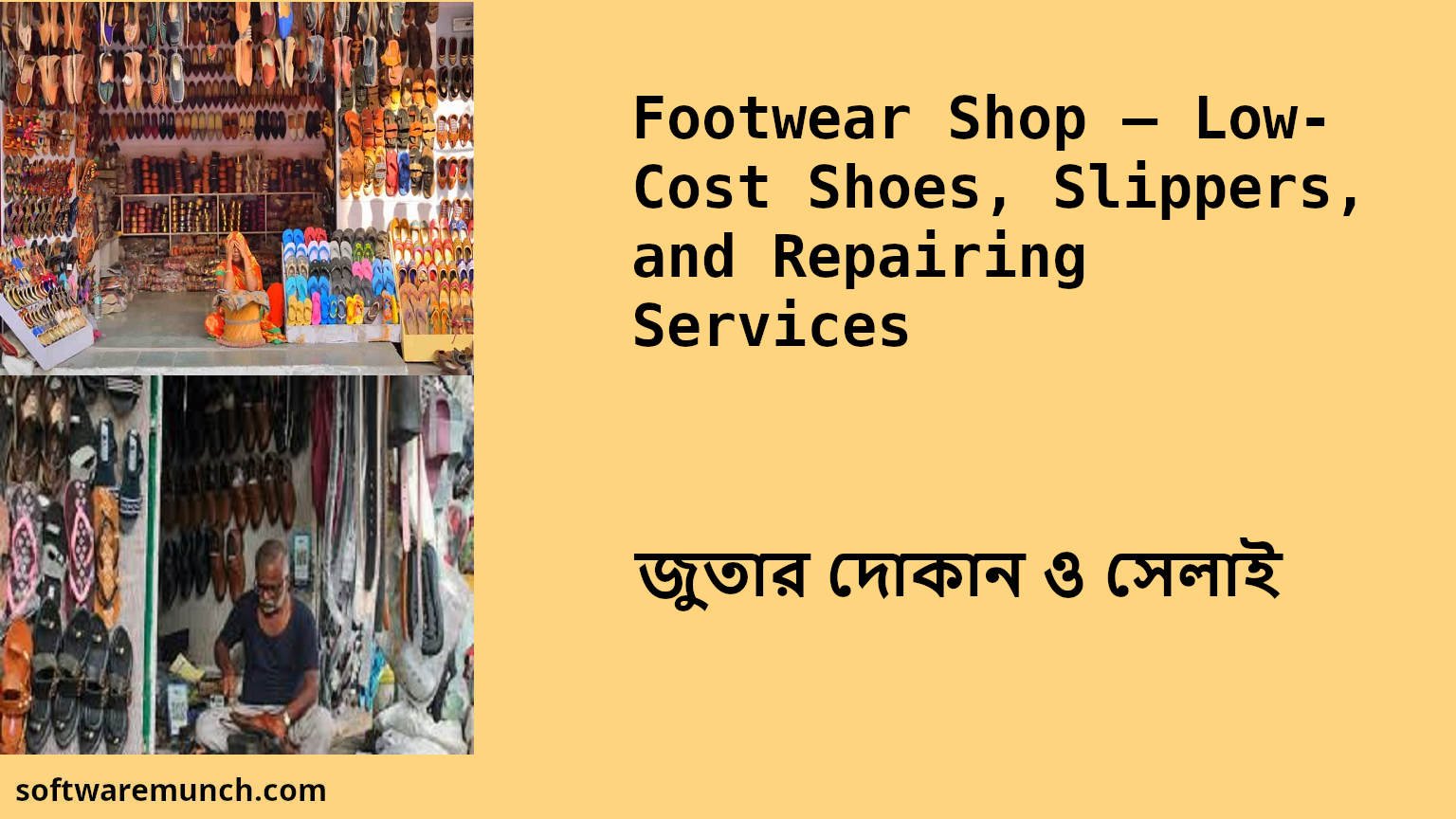In rural Assam many young people dream of starting their own small businesses instead of depending only on farming. One such story is about Jakir Hussain a 27 year old person from Hailakandi , who turned a simple idea into a growing business opening a footwear shop that sells affordable shoes and provides simple repair services.
Jakir’s story from Hailakandi
Jakir had been helping his father in paddy farming in their village near Lala Bazar. While farming gave some income it was not steady. During visits to Hailakandi Bazaar he noticed that people often had to travel to Silchar to buy good footwear. The local market only had a few small shop and a few cobblers sitting on the roadside. That gave him this idea
“What if I open a small shop in Hailakandi itself where people can buy lowcost slippers and shoes and also get their old footwear repaired? কিনা আর জুতা শিলাই এক জেগাত”
Learning shoe repairing
Selling new shoes is simple, you only need to buy and sell. But repairing requires skill. Jakir decided to learn. He spent a few months under an old cobbler ( who is their relative) in Hailakandi Bazaar watching and practicing how to:
- stitch torn sandals and slippers.
- replace straps and soles.
- Polish and restore worn-out shoes.
He also visited Silchar where he observed cobblers near Fatak Bazar and one shop near prem tola using small machines for stitching leather shoes. After six months of practice Jakir was confident enough to handle repairs on his own.
Setting up the shop
Jakir rented a small room near Lala Bazar main road, where many villagers come for their daily shopping. The location was very important easy for both farmers and students to stop by and no shoe shop nearby.
His investment included these things:
- Rs25000 for first stock of slippers and shoes bought from Silchar fatak Bazar wholesalers.
- Rs7 thousand for basic repairing tools ( needles, adhesives, hammer, polish and a stitching machine).
- Rs 3000 for a wooden counter and shelves to display footwear.
- Monthly rent of Rs2500 for the shop.
Arranging the investment
Getting government loans in Hailakandi was not easy. The paperwork for schemes like PMEGP or Mudra yojana was taking too long. So Jakir arranged money in three different ways:
- Personal savings from farm work which his father gave.
- A small loan of Rs15000 from the local cooperative credit society.
- Help from his uncle who runs a grocery shop in Katlicherra.
This way he managed to gather around Rs45 k to start his shop.
Procuring footwear stock
Jakir made regular trips to Silchar wholesale markets—mainly Fatak Bazar and Premtola—where footwear from Kolkata and Delhi arrives in bulk. He bought these items:
- children’s school shoes for rs150 to 250 a pair.
- Rubber sandals for farmers at Rs100 to 120 a pair.
- Women’s low cost slippers at Rs180 to 250 per pair.
- A few branded pairs for special customers.
He also sourced locally made rubber slippers from Karimganj, which are cheap and long lasting. This mix helped him cater to all types of customers in and around Hailakandi.
The Initial struggles
The first few months were tough. People were not sure about a new shop when they were used to buying from Silchar. Some customers demanded credit and Jakir had to carefully decide whom to trust. supply from Silchar was sometimes delayed due to rains and road problems.
But Jakir won people’s trust by doing
- Offering free polishing for repaired shoes.
- giving small discounts to school students.
- Keeping emergency repair services open even on sundays.
Slowly some people started choosing his shop over traveling to Silchar.
Growth of the Business
Within a year time Jakir’s shop became popular. Farmers from nearby villages like Monacherra and Algapur came to buy durable sandals. Students from Hailakandi College and local schools visited before exams for shoe repairs.
He later expanded services by:
- Adding rain shoes before the monsoon.
- selling polish and brushes for school shoes.
- Taking special orders from Silchar for customers who wanted better brands before durga puja or eid.
Problems and challenges
Even though his shop grew, Jakir still faced struggles:
- competition from cheap footwear sellers at weekly Lala haat and churai bazar (market).
- credit pressure from regular customers who delayed payments.
- Seasonal sales : during monsoon and school admission time, sales were high but summer months were slow.
Yet with his patience and good service, he kept the shop running steadily.
Lessons for others
Jakir’s story shows that anyone from Hailakandi, Karimganj or Silchar region can start a footwear shop if they do these simple but important things-
- learn basic repairing skills first.
- start with small stock but not too much at once.
- Build strong connections with silchar wholesalers.
- Keep prices affordable for farmers and students.
A footwear shop is a simple but strong business idea for small towns and villages in india. It does not require very high education, only basic skills, savings and commitment. Jakir Hussain from Hailakandi proved that even with limited resources one can build a respected and useful service.
His shop today not only supports his family but also provides comfort to hundreds of feet in Hailakandi and nearby villages. For many rural youth this is a path worth walking.
